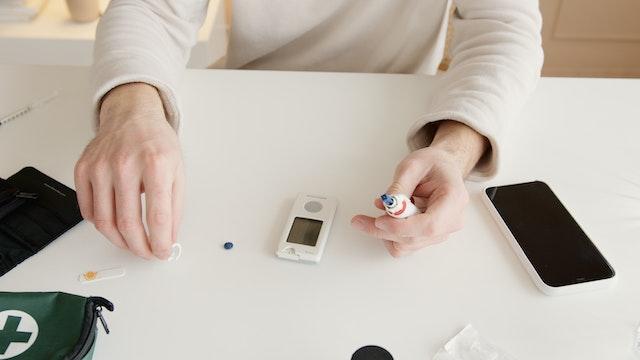Posts Tagged ‘what are the symptoms of hypoglycemia’

Symptoms of Hypoglycemia
When someone with diabetes does not have enough glucose (sugar) in his or her blood it may lead to diabetic hypoglycemia. If you do not have glucose, you cannot function well since it is the main source of fuel for the brain and body.
A blood sugar level below 70 milligrams per deciliter (mg/dL), or 3.9 millimoles per liter (mmol/L) is a low blood sugar (hypoglycemia) for many people. However, there might be a variation in your numbers. Therefore, when you want to know the appropriate range to keep your blood sugar, you should ask your health care provider.
Treat low blood sugar promptly while also being observant of the early warning signs of hypoglycemia. Eating or drinking a simple sugar source like glucose tablets, hard candy or fruit juice can help you to raise your blood sugar quickly.
Additionally, what to do if you are not able to treat the condition yourself and what symptoms to look for should be told to your family and friends.
Early warning signs and symptoms
There are multiple signs and symptoms of diabetic hypoglycemia. However, some of the early indications are:
- Pallor (unhealthy pale appearance)
- Shakiness
- Lightheadedness or dizziness
- Sweating
- Nausea or hunger
- Fast or an irregular heartbeat
- Difficulty concentrating
- Fatigue and feeling weak
- Anxiety or irritability
- On your cheek, tongue, or lips, they will be tingling
Nighttime signs and symptoms
Signs and symptoms that may disrupt your sleep id diabetic hypoglycemia happens when you are sleeping include:
- Due to perspiration, they will be damp sheets and nightclothes
- Nightmares
- Tiredness, irritability, or confusion upon waking
Severe signs and symptoms
Signs and symptoms of hypoglycemia may worsen if diabetic hypoglycemia is not treated. These signs and symptoms include:
- Strange behavior, perplexity, or both, such as the inability to do simple tasks
- Speaking slowly or with difficulty
- eyesight tunneling or haziness
- Inability to eat or drink
- Muscle weakness
- Drowsiness
Severe hypoglycemia may lead to:
- Seizures or convulsions
- Unconsciousness
- Death but or rare occasions
From episode to episode or from person to person, the symptoms can differ. Noticeable symptoms may not be there in some people and therefore there is a possibility of you having hypoglycemia and not having any symptoms.
Because of this, apart from keeping track of how you are feeling when your blood sugar is low and it is important to regularly monitor your blood sugar level.
When to see a doctor
Serious problems such as seizures or unconsciousness that require emergency care can be caused by severe hypoglycemia. Therefore, in an emergency, it is advisable that you ensure your co-workers, friends, and family know what to do.
The people you trust should be informed of hypoglycemia. You might be alerted to early symptoms by others who know what symptoms to look for.
A potentially serious situation can be easier to safely manage if your family members and close friends know where you keep glucagon and how to administer it. The release of sugar into the blood is stimulated by a hormone known as glucagon.
If you are someone who is losing consciousness (not responding) or cannot swallow due to low blood sugar, here is some emergency information to give to others:
- Your blood sugar levels will drop even further if you inject insulin. Therefore, you should never inject it.
- Choking can be caused if given food or fluids and therefore should be avoided.
- Use injection or nasal spray when giving glucagon.
- If glucagon is not on hand, you do not know how to use it or the person is not responding, you should call 911 or emergency services in your area for Immediate treatment.
See your health care provider if you have symptoms of hypoglycemia multiple times a week or more. You may otherwise adjust your diabetes treatment regimen, or need to change your medication timing or dosage.
Causes
If you are taking certain diabetes medications or taking insulin, you are likely to have low blood sugar.
- There are multiple causes of diabetic hypoglycemia and some of the common include: –
- Intake of too much diabetes medication or insulin
- Low appetite
- Skipping or postponing a snack or meal
- Increasing exercise or physical activity without eating more or adjusting your medications
- Drinking alcohol
Blood Sugar Regulation
Food is the main source of the body’s glucose. When blood sugar is too high, blood glucose(sugar) levels are lowered by the insulin hormone.
Taking more insulin than you need can cause your blood sugar level to drop too low and result in hypoglycemia if you have type 1 or type 2 diabetes and need insulin to control your blood sugar.
Further, if you eat less than usual after taking your diabetes medication or if you exercise more than you typically do leading to your body using extra glucose, your blood sugar can also drop too low. It is always not easy to maintain the balance between activity, insulin, and food.
However, you can work with the following people to try to prevent low blood sugar levels: your healthcare provider, registered dietitian, and certified diabetes care and education specialist.
Risk Factors
A greater risk of diabetic hypoglycemia is in some people and they include:
- Those who use insulin
- Sulfonylureas, or diabetes medications, such as glipizide (Glucotrol), glimepiride (Amaryl), or glyburide, are used by patients (Diabeta, Glynase).
- Older people and your kids those whose kidney or liver function is affected
- People with diabetes who have had it for a long period
- Those using several drugs; those who do not experience low blood sugar symptoms (hyperglycemia unawareness)
- Anyone having a condition that makes it difficult for them to react quickly when their blood sugar drops
- Those that consume alcohol
Complications
You may lose consciousness if you ignore the symptoms of hyperglycemia for too long. This is because the functioning of your brain requires glucose.
If hypoglycemia is untreated it can lead to seizures, loss of consciousness, and death hence you should recognize its signs and symptoms early.
The risk of serious or even deadly accidents can be brought by diabetic hypoglycemia and therefore your early symptoms should be taken seriously.
Prevention
To lessen the risk of diabetic hypoglycemia:
- Monitor your blood sugar. You may check and record your blood sugar level several times a week or multiple times a day depending on your treatment plan. The only way to make sure that your blood sugar level remains within your target range is by careful monitoring.
- Do not skip or delay meals or snacks. Be consistent about the amount you eat and the timing of your meals and snacks if you take insulin or oral diabetes medication.
- Measure medication carefully and take it on time. Follow your doctor’s advice when taking your medication.
- If you increase your physical activity, adjust your medication or eat additional snacks. What medications you take, the type and length of the activity, and the blood sugar test results determine the adjustments. When making adjustments, follow your diabetes treatment plan.
- If you choose to drink, eat a meal or snack with alcohol. Hypoglycemia can be caused by drinking alcohol on an empty stomach. Blood sugar monitoring is even more important when drinking alcohol since it may cause delayed hypoglycemia hours later.
- Record your low glucose reactions. You and your medical team may be able to use this to spot tendencies that lead to hypoglycemia and figure out how to stop them.
In an emergency and to let others know that you have diabetes, carry some form of diabetes identification. A wallet card or bracelet and medical identification necklace can be used.
FAQs
Does diabetes cause hypoglycemia?
When a person with diabetes does not have enough glucose(sugar) in his or her blood it may lead to diabetic hypoglycemia. If you do not have glucose, you cannot function well since it is the main source of fuel for the brain and body.
What does diabetic hypoglycemia feel like?
When blood sugar levels fall below four millimoles (mmol) per liter, symptoms of diabetic hypoglycemia usually occur.
Sweating, trembling or shakiness, and feeling hungry are some of the typical early warnings. You may also feel confused and have difficulty concentrating in more severe cases.
Can you have hypoglycemia with untreated diabetes?
When the sugar levels (glucose) in your blood are too low is when a condition known as hypoglycemia occurs. This condition can occur in people who do not have diabetes despite many people thinking that it only occurs in people with diabetes.
What happens when a diabetic has a hypoglycemic episode?
When blood sugar levels are too low i.e., below 70 milligrams per deciliter (mg/dL) it may lead to a severe hypoglycemia.
Such low levels of blood sugar can lead to seizures and become life-threatening without treatment. With such low levels of blood sugar, it becomes a medical emergency.
What foods should hypoglycemics avoid?
Your blood sugar levels can fluctuate significantly if you eat the following foods and therefore, they are not suitable for people with hypoglycemia:
- White bread, pasta, and white rice
- Trans fats
- Sugar-sweetened drinks
- Fruit-flavored yogurt
- Sweetened breakfast cereals
- Honey, agave nectar, and maple syrup.
- Dried fruit.
What will happen if hypoglycemia is not treated?
Any of these severe symptom’s seizures, unconsciousness, and eventual death can be caused if hypoglycemia is left untreated. Because of this, no matter the cause, it is critical to treat low blood sugar immediately.
Can hypoglycemia lead to death?
Apart from severe hypoglycemia being fatal and accounting for up to 10% of deaths among young people with type 1 diabetes, it also causes coma, seizures, and brain damage.
How long does it take to recover from hypoglycemia?
Recovery from any acute cognitive decrement after severe hypoglycemia was completed by 1.5 days as per general suggestion results.
Does hyperglycemia cause weight gain?
Since people with hyperglycemia use food to raise their blood sugar, they may find they gain weight because they are eating more calories than they would normally.
Does stress cause hypoglycemia?
Serious changes in blood sugar levels can be caused by repeated episodes of stress and it is important to be aware.
This aids in increasing the risk of hypoglycemia (low blood sugar) since it is harder for diabetics to manage their condition.
Can hypoglycemia cause stroke?
There is both a higher risk of stroke and poor stroke outcomes in diabetic patients compared to non-diabetic subjects. In both T1D and T2D patients, frequent hypoglycemia is observed.
Hypoglycemia may increase the risk of stroke in diabetic patients according to suggestions from pre-clinical studies.
How can I fix my hypoglycemia fast?
Get fast-acting carbohydrates and eat or drink 15 to 20 grams of them. These sugary foods or drinks are easily converted to sugar in the body since they are without protein or fat.
15 minutes after treatment, recheck your blood sugar levels and then have a meal or snack.



